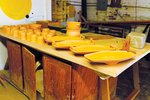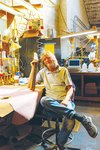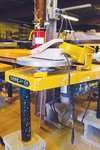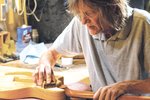




SILER CITY — Business incubators — shared-space facilities offering affordable rent and world-class tools to up-and-coming entrepreneurs — have become a roaring trend in America’s post-millennial quest to break the traditional work model.
Siler City, though, has long been ahead of the game.
The N.C. Arts Incubator, a 501(c)(3) non-profit on N. Chatham Avenue in Siler City, has operated for more than 20 years. Its tenants aren’t looking to start the next big app or revolutionize business, though. They want a setting and community amendable to their creative passions: painting, pottery, sculpture, photography and more.
“The idea of the Incubator is we’re incubating artists with studio space that’s affordable,” NCAI interim director Michael Feezor said, “and giving them access to equipment that would be very expensive if they bought it themselves.”
Feezor has not worked in his current capacity for long. He replaced former director April Weaver when the pandemic began.
“Due to the sudden financial uncertainty brought on by the pandemic shutdown,” he said, “we had to let April go, and as chairman of the board I was in unique position to step into the role of interim director as volunteer.”
It’s not a position Feezor relishes; he would rather have more time to pursue his own art.
Feezor is a sculptor by education, but eclectic interests have inspired a multifarious career spanning the artistic spectrum. He only moved to Siler City three years ago — and the NCAI was central to his decision.
“I wouldn’t live here if not for the Incubator,” he said.
Feezor’s sentiment is typical of Siler City’s arts community. Towns with an industrial-focused past and employment base haven’t always offered a welcoming environment to creative types. But the NCAI set its mission to change that.
Before the coronavirus pandemic began nine months ago, the Incubator launched several efforts to stimulate and promote development of artistic pursuits among Siler City residents, especially its youth.
“In 2019 we started a STEAM (science, technology, engineering, arts, math) program in partnership with the Chatham Center for Innovation …” Feezor said. “NCAI developed and was working to deliver a series of arts programs targeted to advancing STEAM education in our community and across the state.”
The Incubator also hosted an Artists in Residence program which — besides offering cost-efficient studio space and a community of like-minded people — trained aspiring artists in how to understand loan terms, find new growth markets and complete business plans. To be a successful artist involves more than just creativity and originality, Feezor said. One must still understand the fundamentals of business operation.
Many of the NCAI’s services have been paused, though, while the pandemic drags on. In the past, NCAI has extended free studio space to certain artists, but while the pandemic continues, free services are not financially viable. Still, members can rent private workspaces with 24/7 access to shared equipment for just about a couple hundred dollars per month.
The Artists in Residence program has also been suspended and the gallery show schedule, which often featured work from Incubator artists, has been shuttered pending further notice. But Feezor is not concerned with the non-profit’s survivability, nor the endurance of its mission.
“I don’t see why being careful for one year of our lives will be of much detriment to our culture,” he said. “We will resume as soon as it’s feasible and safe.”
The Incubator’s sprawling facility covers most of its historic downtown block, sharing space with the town’s popular coffee shop, The Chatham Rabbit. In the past, the NCAI housed as many as 20 artists at a time. Now it has nine.
“Some just weren’t comfortable coming to a public space,” Feezor said.
Among the artists still working out of the Incubator are a photographer, several potters, sculptors and custom guitar maker Terry McInturff — NCAI’s longest standing member.
“I came out here coming up on 20 years ago now,” McInturff said.
In the late 1990s, McInturff was running his business out of a shop in Holly Springs, producing 10 guitars a week with a global clientele.
“Leon Tongret (the Incubator’s founder) had been knocking on my door,” he said. “He kept nagging me about his place out in Siler City that he was getting up and running. But I was doing fine and didn’t pay him much attention.”
Then the economy crashed in 2001, and McInturff’s guitar shop was turned on its head.
“Overnight, $85,000 worth of orders got canceled,” he said. “I had to lay everyone off.”
The disaster would have been a fatal blow to McInturff’s business, but Tongret extended his offer again. This time, McInturff agreed.
“It turned into literally saving my career,” he said.
McInturff, a Chicago native who moved to North Carolina at age 17, has been a luthier almost 43 years. In the early days, most of his income came from repair and restoration. Eventually, though, word got out that he had a knack for scratch-made custom guitars.
“My mantra is that I’m building a sound,” he said. “Even though it’s an electric guitar, it’s an acoustic guitar first.”
In a single block of wood — 14 inches by two inches by 10 feet — McInturff usually identifies three or four different sound qualities. When the sound isn’t up to snuff, he discards the block, regardless of its cost or aesthetic appeal.
“I could play 10 brand new Gibsons at Sam Ash and get probably seven different personalities,” he said.
McInturff’s acute ear and attention to detail have earned him a glowing reputation among the world’s most discerning buyers. He counts Eric Clapton, Jimmy Page, David Hidalgo and many other acclaimed guitarists among his clientele, although he’s slow to admit it — never eager to magnify his own accomplishments. He is quick, however, to emphasize the NCAI’s role in his life and business.
“This Incubator has been a saving grace, a tremendous blessing for me,” he said. “I’d never been part of a community of like souls and I love it.”
McInturff’s experience exemplifies what Feezor hopes more in Siler City will come to recognize.
“Thanks to the incubator, you can be in a town like this and make world-class work,” he said. “A big economic benefit that I don’t think we’ve taken advantage of is four major highways running through town, a train station that could be a major stop and an airport.”
While the coronavirus pandemic continues, the Incubator will remain largely quiescent. But Feezor is rearing to continue its expansion of services when circumstances allow, encouraging aspiring artists to launch their careers in Siler City.
“The potential is kind of ginormous, but it’s really the story of a struggling small town,” Feezor said. “The goal is to show that people don’t need to go somewhere else.”
To learn more about the N.C. Arts Incubator or to make a donation to the non-profit, visit www.ncartsincubator.com.
Reporter D. Lars Dolder can be reached at dldolder@chathamnr.com and on Twitter @dldolder.